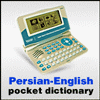 Cohen kohan Cohen kohan
What's the relationship between the Jewish name "Cohen" and
the Persian word "kohan"?
Farhad M.
April 26, 2005
iranian.com
The traditional Jewish Passover feast
was celebrated last Sunday by Jews in Iran, once the largest community
outside Israel and yet the largest community in the Middle East
even today.
Passover marks the anniversary of withdrawal of the Israeli clan
from Egypt and their heading towards Jerusalem starting on the
15th day of the month of Neisan of the 5765th year of the world
creation, coinciding with April 24, 2005. On this day, Moses was
commissioned by the Lord to lead the Israelis from Egypt towards
Jerusalem. It is usually referred to as the Exodus from Egypt.
I am not Jewish. But as an Iranian who has a keen interest in
the etymology of the words we use, I've often asked myself :
What's the relationship between the Jewish name "Cohen" and
the Persian word "kohan" which means "ancient" or
more precisely "From immemorial times"? And as a coincidence
Ahron Cohen, the first of the line of Cohens, had lived in the
time of the Exodus from Egypt, from which the Passeover feast originates.
Here are some thoughts to build upon:
"Cohen" in Hebrew means "the one who
is in the service of the Lord" or simply put "Priest".
There are even some Greek etymologists who dare to say that this
words meaning
comes from a Greek influence (see grecoreport.com).
Lately I've read about a Jewish scientist who tried to answer
the following question: Could the Cohen line have been maintained
since Sinai, and throughout the long exile of the Jewish people?
To answer this question, this scientist has used DNA tests and
ended up with a collection of markers which has come to be known
as the Cohen Modal Haplotype (CMH)--the standard genetic signature
of the Jewish priestly family (see cohen-
levi.org).
Jewish tradition, based on the Torah, is that all Kohanim are
direct descendants of Aharon, the original Kohen. The line of the
Kohanim
is patrilineal: it has been passed from father to son without
interruption from Aharon, for 3,300 years, or more than 100 generations,
the
approximate time of the Exodus from Egypt, the lifetime of Aharon
Kohen.
The word "Kohan" in Persian has a derivative such as "Kaahen" meaning "the
one who can see into the future". Both words are also related
to the word "Kaahenaat" which in modern Persian
is pronounced "Kaa'enaat", a word which is plural
in nature and could be translated into "the timeless universes
of beingness".
According to modern Persian grammar "Kaahenaat" could
be the plural of "Kohan", and may have found its pronunciation
and meaning transformed (somewhat expanded) in time. In fact the
word "Kaahenat" or "Kahenat" had been even
transferred from Persian to some Christian Churches such as the
Ethiopian Church where it also meant "Priest" (see
here). Again
a deformation of the original meaning of the word (from a Persian
standpoint).
 Kaahenaat, Kohan and Kaahen are
Persian words that refer to the underlying fabrics of beingness
which are timeless (Kaaenaat), which
in terms of the human consciousness are translated into "Ancient" (Kohan),
and because of its timeless nature, can see into what the human mind
perceives as the future (Kaahen). Kaahenaat, Kohan and Kaahen are
Persian words that refer to the underlying fabrics of beingness
which are timeless (Kaaenaat), which
in terms of the human consciousness are translated into "Ancient" (Kohan),
and because of its timeless nature, can see into what the human mind
perceives as the future (Kaahen).
The fact that the meaning of the
word Cohen has turned with time
into "priest" or "the one who is in the service of the Lord" is
more related to the social position of those who were named Cohen in the community.
But that does not indicate the meaning of the word itself. It relates more to
the fact that in any community ancients or ancient families usually gave guidance
to the rest of the
community.
|